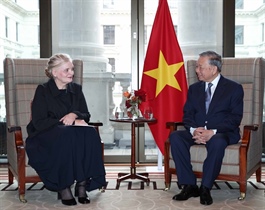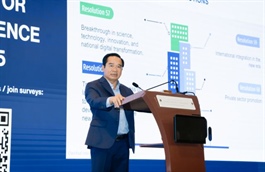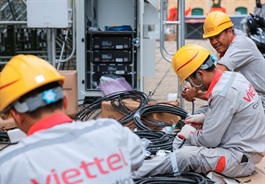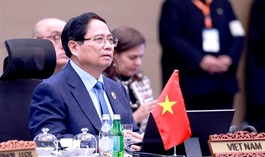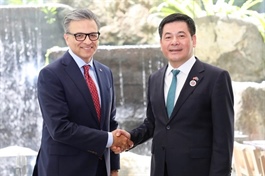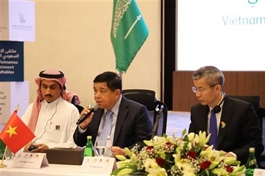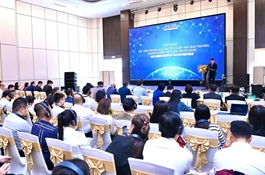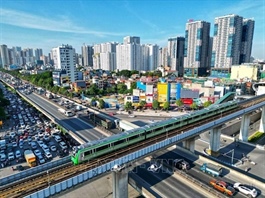Việt Nam remains Japan's leading investment destination: expert
Việt Nam remains Japan's leading investment destination: expert
Japan's policy direction is increasingly focused on strengthening cooperation with Southeast Asia, said Masafumi Ishii, former Japanese Ambassador to Indonesia and president of the Resona Research Institute.
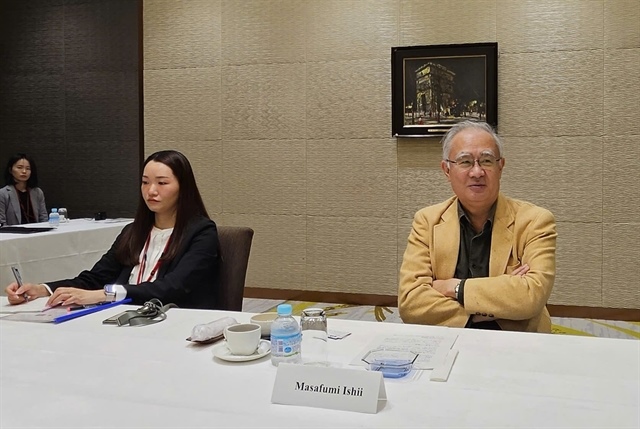
Masafumi Ishii (right), former Japanese Ambassador to Indonesia and president of the Resona Research Institute, at the luncheon meeting in Tokyo. — VNS Photo Ly Ly Cao |
Japan is stepping up engagement with ASEAN countries, including Việt Nam, as global trade tensions, protectionist trends and geopolitical shifts reshape regional economic dynamics.
Speaking at a luncheon meeting held by the Kaizai Koho Centre on October 29, Masafumi Ishii, former Japanese Ambassador to Indonesia and president of the Resona Research Institute, highlighted that Japan's policy direction is increasingly focused on strengthening cooperation with Southeast Asia, a region he described as having "great potential" for future investment and partnership.
"Global uncertainties, escalating geopolitical tensions and Trump's tariff policy are boosting Japan to strengthen ties with ASEAN countries, including Việt Nam," Ishii said.
He noted that the Japanese government is preparing new initiatives to deepen engagement with the region.
Among ASEAN members, Việt Nam is expected to remain a top priority in Japan's strategy, particularly in the fields of artificial intelligence (AI), information technology (IT) and infrastructure development, he told Việt Nam News and Law.
According to Ishii, infrastructure development will continue to play a pivotal role in Japan’s economic cooperation with ASEAN.
"There is still a funding gap between the necessity and the amount of capital available," he said, pointing out that Japan sees value in helping bridge this gap.
Japan's infrastructure investment in the region, he emphasised, is not merely about economic returns but also aboutstrengthening ASEAN unity through physical connectivity.
"Infrastructure building is a good project for strengthening the unity of ASEAN by creating connections between member countries, such as the East-West Corridor and the North-South Corridor," Ishii said.
"Connecting ASEAN members serves our purpose of promoting unity. So I think we will continue to do it."
These corridors, long-term regional projects that link the Mekong subregion's transport and logistics systems, are viewed by Japan as crucial for enhancing intra-ASEAN trade, supply chain resilience and equitable development.
Human resource investment
While infrastructure remains a cornerstone of Japan's cooperation, Ishii stressed that human capital development will be the next key area of investment.
He underscored the growing importance of vocational training and workforce upskilling in sustaining economic growth for ASEAN nations, particularly Việt Nam.
"If you want to grow faster or reach the next level, which I think Việt Nam is trying to do, you need to increase productivity," he said.
"To increase productivity, you need more excellent vocational training."
He added that much of ASEAN, including Việt Nam, is approaching a growth ceiling where expanding domestic demand or exports alone is insufficient to drive the next stage of economic progress.
"If you want to break that limitation, you need more talented labour," Ishii said.
Japan, facing a shrinking population and labour shortages, also stands to benefit from such cooperation.
Ishii described this as a "win-win situation", one where ASEAN countries can enhance their human resource capabilities while Japan gains access to skilled labour and innovative minds.
"For the sake of innovation and increasing productivity in Japan, we need input from the most excellent brains from abroad," he explained.
"All the countries in the world are now competing to attract talented people, Indians, Chinese and Americans. We need to compete too."
He cautioned that without such international collaboration, Japan could struggle to sustain growth.
"If we cannot increase productivity because our population is shrinking, our GDP will decline. To maintain growth, we need much higher productivity, and for that, we need input from abroad," he added.
Beyond economic cooperation, Ishii also urged ASEAN countries to strengthen internal cohesion and resolve intra-regional conflicts to maximise their collective potential.
"ASEAN countries also need to focus on solving your own conflicts within the member countries," he said, implying that unity is essential for the region’s stability and long-term prosperity.
Japan's evolving partnership with ASEAN, and particularly Việt Nam, reflects a broader regional trend toward mutual dependency in innovation, talent and technology.
- 21:30 29/10/2025



